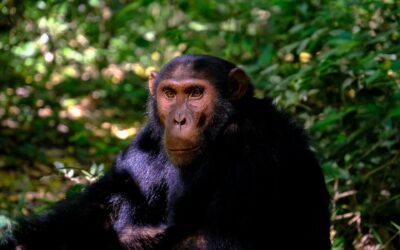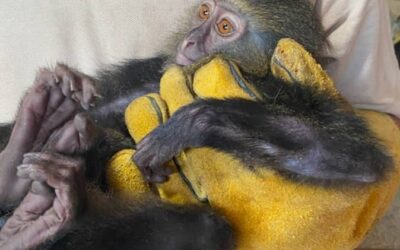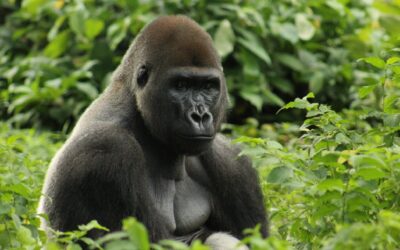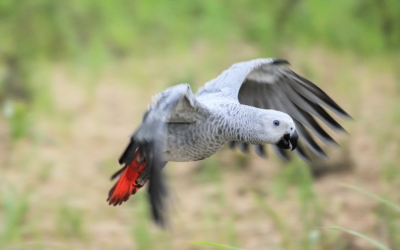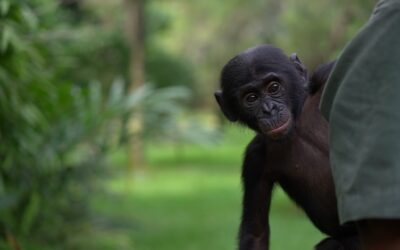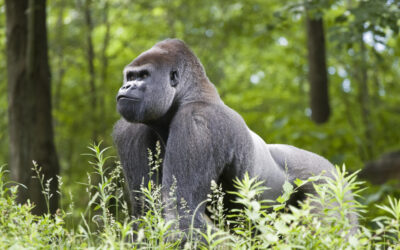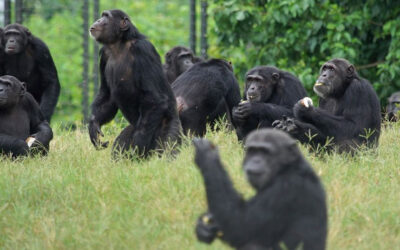Four Rescued Chimpanzees in Desperate Need of Help!
Smugglers’ leader and several others arrested.
By Natasha Tworoski
Four young chimpanzees were just rescued from deplorable conditions at a roadside facility in Guinea. A collaboration between WARA Conservation Project, Interpol, agents of the Ministry of the Environment and the Chimpanzee Conservation Center (CCC) arranged the confiscation and rescue. There is only one wildlife sanctuary equipped to receive chimpanzees in Guinea, the CCC, one of PASA’s pioneering member sanctuaries.
Several people were arrested as a result of the confiscation, including the leader of the smuggling operation, Colonel Ibrahima Bangoura. Bangoura had been under investigation since 2013 on suspicion of illegal wildlife trafficking.
A total of 33 animals were rescued (12 species) and included turtles, ostriches, a crocodile and a baboon in addition to the four chimps. The animals were confiscated from two private locations which were being described as “zoos” but were actually midway points for the animals on their way to the international black market pet trade.
This major victory for conservation efforts in Guinea follows another series of major arrests in Guinea that occurred in March after a group was shut down that is believed to have trafficked wildlife for 30 years.
Fortunately, most of the animals in this collection were deemed fit enough to be returned to the wild immediately. The exception to this is the four chimpanzees, which include a teenage male, a 5 year old female and two 2-3 year olds.
CCC has committed to nourish and care for these four chimps with the hope of returning them to the wild after they are healthy and learn how to interact appropriately with other chimpanzees. These animals will go through a quarantine period until they are deemed healthy, then will be introduced to a community of chimpanzees living at the CCC. They need your help now!
As big of a challenge as it is to rescue chimpanzees from these horrifying situations, it takes even more time, energy and money to rehabilitate them. New chimpanzees to a sanctuary often require 24/7 care initially, frequently suffering from skin and respiratory disease, malnutrition and psychological disorders. After this, the introduction process must be taken slowly to avoid injuries occurring to the new chimps as they are slowly integrated into their new family. A crowdfunding page has been established to raise the necessary funds for this PASA sanctuary that needs our help more than ever! They are in need of 8,000 euros, approximately $8,700 USD, in order to provide the care these four chimpanzees need to have a chance.
The CCC returned their first community of chimpanzees to the wild on June 27, 2008 into the Haut Niger National Park of Guinea. It’s wonderful to give these abused chimps a second chance to be wild, and furthermore it’s a huge achievement for chimpanzees as a species. With the ever-increasing pressure from bushmeat and poaching for the illegal pet trade, chimpanzees are critically endangered and the threat of extinction is ever present. Chimpanzees have already gone extinct in Gambia, Burkina Faso, Benin and Togo. Returning animals to protected areas of their remaining habitat is an important component of protecting then from extinction.

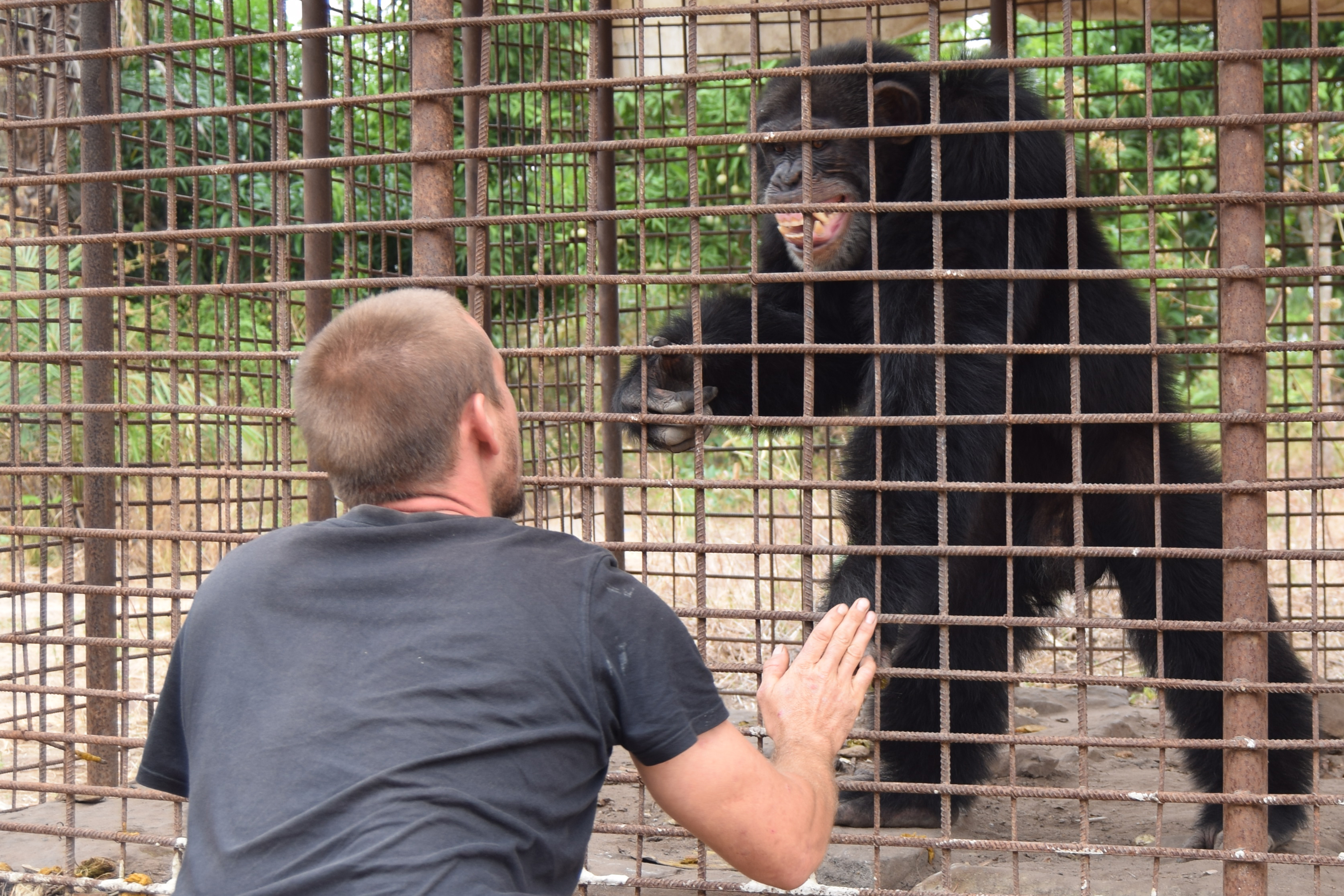
Next Posts
5 Summer Activities to Foster Conservation Education with Young Children
Here are 5 fun and educational activities that promote conservation awareness and environmental responsibility.
PASA and the QATO Foundation Partner to Protect Chimpanzees in DRC
PASA and its member J.A.C.K. Sanctuary partner with the QATO Foundation to create a bold new island sanctuary for up to 120 rescued chimpanzees in the DRC.
Trophy Hunting Myths Debunked
NGOs tackle misinformation about trophy hunting spread by the hunting lobby.
Largest Seizure of Monkeys in Africa Welcomed to J.A.C.K. Sanctuary in the Democratic Republic of Congo
Trafficking of African primates from Africa to Asia was thwarted with confiscated animals repatriated and sent to an accredited PASA member sanctuary.
5 Ways to Help Save Gorillas
Anyone can have an impact on gorilla conservation through simple actions.
Celebrate World Parrot Day with PASA!
This World Parrot Day, we are celebrating four of our amazing member sanctuaries that offer a second chance to rescued parrots!
What is an Endangered Species?
This article explains what it means to be “endangered” and explores how human activities can threaten species. It also highlights how Pan African Sanctuary Alliance (PASA) member centers rescue, rehabilitate, and conserve endangered primates and their habitats.
Celebrate 23 Years of PASA in 2023
PASA turns 23! It’s 2023 and we’re asking you to help us celebrate our 23 member sanctuaries and our 23 years of protecting primates. To mark this day, we are launching our Primates Forever Campaign to ensure magnificent great apes and monkeys remain wild and protected.
Viruses in Sanctuary Chimpanzees Across Africa
New research finds that sanctuary chimpanzees are infected with viruses previously found in wild chimpanzees. Additionally, it suggests that, like in the wild, sanctuaries experience reverse zoonotic respiratory virus transmission.
Women in Conservation: Two Wildlife Heroes in West Africa
This International Women’s Day, celebrate the dedication and achievements of two women working to protect wildlife and inspire the next generation in West Africa.


